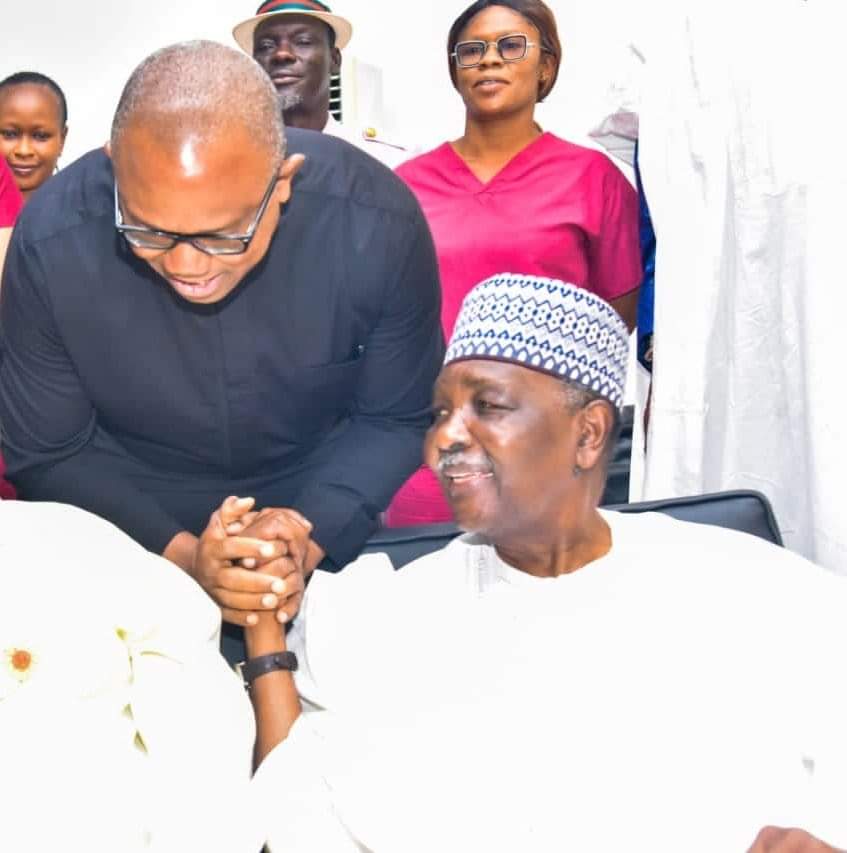
By Igbo History
In what seems like a diplomatic high-wire act to boost his presidential prospects, Peter Obi, former Anambra State governor and Labour Party presidential candidate, has stirred controversy with his congratulatory message to General Yakubu Gowon on his 90th birthday. The gesture, which Obi framed as an act of Christian forgiveness and reconciliation, has triggered backlash, especially among those sensitive to the traumatic memory of the Nigerian Civil War.
Obi acknowledged the mixed reactions, saying, “Some Nigerians, both publicly and privately, have expressed their sentiments to me.” However, he emphasized that his greeting was an attempt to shift Nigeria’s narrative from the scars of the war towards healing and progress. “The ultimate heroism is forgiving the enemy and moving forward,” Obi declared, hinting that Nigeria must transcend its darkest historical moments.
In a message laden with biblical references, Obi explained his philosophy: “There are two responses to acts of evil—revenge, or forgiveness with the hope to forget. I chose the latter.” He justified his position by citing Nigeria’s symbolic national burial of Biafran leader, Dim Chukwuemeka Odumegwu Ojukwu, during Obi’s tenure as Anambra governor, calling it “the boldest indication to the world that Nigeria is ready to reconcile and move forward.”
The congratulatory gesture, however, has not gone down well with some civil war survivors and Biafra sympathizers, who argue that Obi’s message trivializes the pain and suffering endured by millions of Ndígbo during the war. Critics accuse Obi of downplaying the atrocities of the past to curry favor with a broader Nigerian electorate, describing his act as a political move to secure national acceptance for his presidential ambitions.
Obi remained unyielding, stating, “I was under ten years old when the war began. Most of my supporters were born after it. Dragging them back to that dark history would derail the message of a New Nigeria that we believe is POssible.”
He defended his controversial decision to congratulate Gowon, urging Nigerians to focus on the transformative power of forgiveness. “Hate has held our society down for too long,” Obi said, “and it’s time to stop.”
The big question now is: Does Obi’s ‘New Nigeria’ vision demand we gloss over the millions Igbos lost in the Biafra genocide, or is it a necessary step to unite a divided nation? Either way, Obi seems to have sent a clear signal—his sights are firmly set on the future, even if it means leaving painful memories behind.
, Let’s Move On for 2027?
In what seems like a diplomatic high-wire act to boost his presidential prospects, Peter Obi, former Anambra State governor and Labour Party presidential candidate, has stirred controversy with his congratulatory message to General Yakubu Gowon on his 90th birthday. The gesture, which Obi framed as an act of Christian forgiveness and reconciliation, has triggered backlash, especially among those sensitive to the traumatic memory of the Nigerian Civil War.
Obi acknowledged the mixed reactions, saying, “Some Nigerians, both publicly and privately, have expressed their sentiments to me.” However, he emphasized that his greeting was an attempt to shift Nigeria’s narrative from the scars of the war towards healing and progress. “The ultimate heroism is forgiving the enemy and moving forward,” Obi declared, hinting that Nigeria must transcend its darkest historical moments.
In a message laden with biblical references, Obi explained his philosophy: “There are two responses to acts of evil—revenge, or forgiveness with the hope to forget. I chose the latter.” He justified his position by citing Nigeria’s symbolic national burial of Biafran leader, Dim Chukwuemeka Odumegwu Ojukwu, during Obi’s tenure as Anambra governor, calling it “the boldest indication to the world that Nigeria is ready to reconcile and move forward.”
The congratulatory gesture, however, has not gone down well with some civil war survivors and Biafra sympathizers, who argue that Obi’s message trivializes the pain and suffering endured by millions of Ndígbo during the war. Critics accuse Obi of downplaying the atrocities of the past to curry favor with a broader Nigerian electorate, describing his act as a political move to secure national acceptance for his presidential ambitions.
Obi remained unyielding, stating, “I was under ten years old when the war began. Most of my supporters were born after it. Dragging them back to that dark history would derail the message of a New Nigeria that we believe is POssible.”
He defended his controversial decision to congratulate Gowon, urging Nigerians to focus on the transformative power of forgiveness. “Hate has held our society down for too long,” Obi said, “and it’s time to stop.”
The big question now is: Does Obi’s ‘New Nigeria’ vision demand we gloss over the millions Igbos lost in the Biafra genocide, or is it a necessary step to unite a divided nation? Either way, Obi seems to have sent a clear signal—his sights are firmly set on the future, even if it means leaving painful memories behind.

